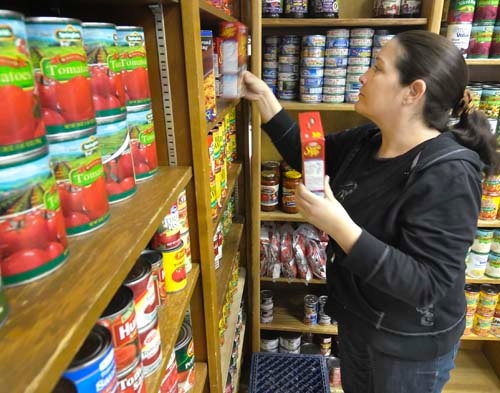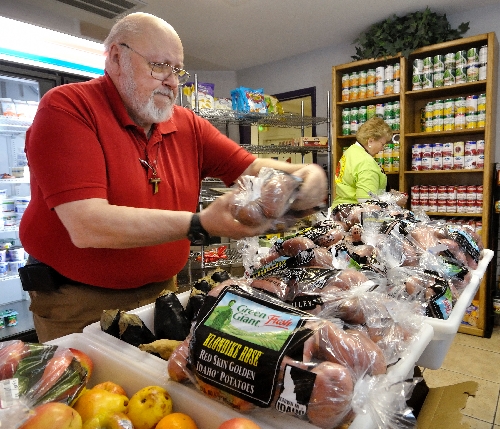St. Therese Center reaches out to those with HIV/AIDS
It's quite possible that the St. Therese Center saved the life of 37-year-old David.
David, whose last name won't appear in this story, has AIDS. That fact explains the absence of his last name, but, ironically, also was part of a chain of events that saved David's life.
Not long ago, David had everything he wanted -- a landscaping business, a dream house, security and satisfaction. Then, around 2006, the economy changed, and he started to lose it all.
"I didn't want to take it anymore," David says.
He took a Sharpie and wrote "DNR," for "do not resuscitate," on his chest, and then attempted to overdose on pills.
When he awoke in the hospital -- transported by ambulance, but he says he's still not sure how -- he was intubated and paralyzed, and his 74-year-old grandmother was by his side.
"Nana brought me home, taught me how to tie my shoes, taught me how to talk again," David says.
He promised her he wouldn't try to hurt himself again. Before long, he got a part-time job. And then one day, he says, a man appeared at his workplace, handed him a piece of paper and said, "You have AIDS. Sign this."
"It was the health department notifying me," David says. "So imagine the rest of my day at work."
He lost his job and resigned himself to death. Still, he says, "I wanted to keep my promise to my Nana."
He went to Clark County Social Services. He was evaluated and referred for counseling. And a counselor asked his immediate needs.
"Food," David remembers saying. "He brought me to the St. Therese Center."
There, David registered as a client.
"I walked out with $30 in Albertsons gift cards and went home with an abundance of food for me and my family," which, besides his grandmother, also included his grandfather, who had had a stroke.
"When I walked in the door, my Nana said, 'The Lord will provide.' "
David says he waited two weeks to return to the center -- "I didn't want to be greedy." When he did, he met the Rev. Joseph O'Brien, executive director. O'Brien ensured that David got lunch and a haircut, and suggested he attend an upcoming retreat.
"He encouraged me to live with this virus, not die with it," David says. "The retreat saved me. The emptiness was filled. I feel content. It's totally changed my life and brought me closer to Christ. If I go tomorrow, it's OK. I'm happy for the first time in my life. It's a wonderful ministry. I'm very proud to have it in my life."
The St. Therese Center was founded in 1998. O'Brien says he moved to Las Vegas that year at the request of the bishop of the sponsoring Diocese of Las Vegas.
The center has a pantry and lunch program at the St. Rose Dominican Hospital Rose de Lima campus, a satellite pantry at the St. Rose Dominican Hospital San Martin campus and a Laughlin outreach.
Catholic Charities of Southern Nevada provides storage and office space.
"The thing that's amazing is we're reaching out to over 4,000 men, women and children who are HIV-positive," he says.
When O'Brien arrived in Las Vegas, he says, about five agencies had food pantries for people who were HIV-positive. Today, St. Therese is the only one.
"The need was so tremendous, and in a sense we were starting to meet it," O'Brien says. "We just started growing and growing. When we realized we were the only pantry left, we started dedicating other rooms for the pantry. It took over the building."
Six days a week, he says, the center picks up from a number of Fresh & Easy, Albertsons and Trader Joe's stores and Glazier's Food Marketplace.
"That's tremendous," O'Brien says. "As are the various food drives that the parishes have for us. And on the 15th of every month, thanks to a very generous benefactor, we give $40 Albertsons gift cards to our clients."
The lunch program provides sandwiches, and they still offer haircuts and retreats. They also refer to other agencies, which meet such needs as housing and medication.
"The collaboration is great with those agencies," O'Brien says.
And St. Therese offers help for one-time emergencies.
Keith, who was diagnosed with AIDS in 2007, says he initially went to the center in search of someone to talk to; but when some personal property was lost, O'Brien helped replace it.
O'Brien has been involved in the fight against AIDS and HIV for more than 30 years, first in Orange County, Calif., then San Francisco, Phoenix and Las Vegas.
But while much more information is available than in the early days of the disease's diagnosis, there still is a stigma, he says. Many people remain afraid.
"Maybe because it isn't in the news, out in front of people," O'Brien says.
He recounted the story of one client who went to a local doctor, and at the end of the visit, the doctor hugged the woman, who immediately began sobbing. She had been to eight doctors in the past two years, and this was the first one who had touched her.
One day recently, O'Brien says, a woman walked into the center's main location and asked, "What do you do here?" Told the center's purpose, "She turned around and walked out."
Some people, it seems, need a reminder that HIV touches all segments of society. One of his 29 volunteers, he says, is a woman whose mother died in her 80s from a tainted blood transfusion. And the center recently gave Easter baskets to client families and has a back-to-school program handing out backpacks.
"If one of the kids is positive, we're not going to skip his brother and sister," he says. "Obviously, we'll do the whole family."
He says the center accepts private donations and obtains grants to meet the community's needs, which are increasing. Because of advances in medical treatment, people who are HIV-positive "are living well and longer," he says. "But with the economy the way it is, we have some clients who had not joined us in 1998 but now are."
O'Brien accepts that there is no cure for the virus, but he has seen a lot of changes.
"In San Francisco in the late Eighties , because some good new medicines were coming out and people were living longer, the hospices were starting to close," he says. "People were angry because they were losing their jobs."
It's a sentiment that O'Brien doesn't hold, now or then.
"I'd be more than happy to go out of business."
Contact reporter Heidi Knapp Rinella at hrinella@reviewjournal.com or 702-383-0474.



















